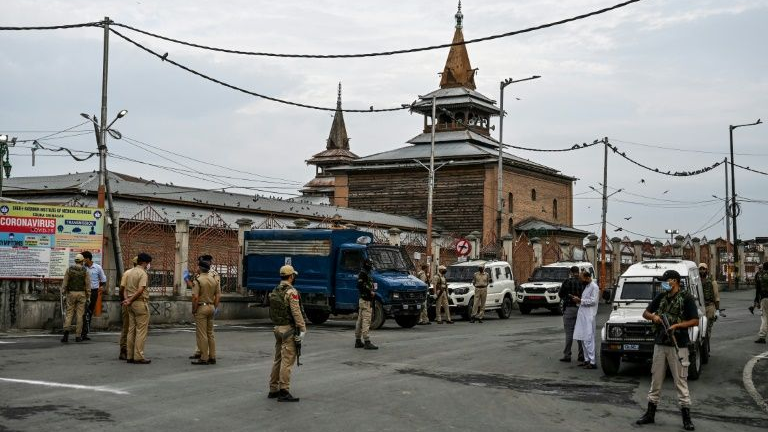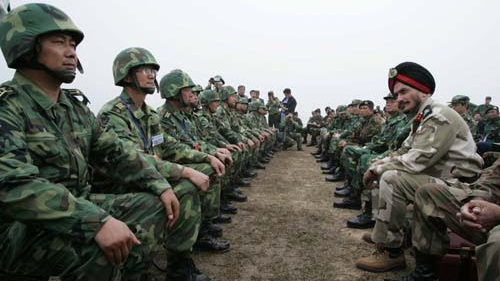
Security personnel stand guard outside the grand mosque in Srinagar. /AFP
Security personnel stand guard outside the grand mosque in Srinagar. /AFP
Editor's note: Iram Khan is a Pakistan-based commentator on international affairs. The article reflects the author's views, and not necessarily those of CGTN.
On August 2, militaries of China and India held the fifth round of talks since their deadly clash in the Himalayas on June 15. The interaction was a positive development in the bilateral relationship that has been at a low with New Delhi taking the tension into non-military domains.
For now, the frontline troops on both sides remain disengaged despite some heavy deployments reported by Indian media at Daulat Beg Oldi, an Indian military station near the Chinese border.
While the Chinese side has called for a peaceful settlement of the issue ever since the onset of hostility, India's willingness to come to the table, too, is a welcome sign and denotes a realization that confrontation is not an option that can solve the border dispute.
But India has to keep in mind that weaponizing trade is not a solution either. The military talks were held at a time when India is attempting to restrict Chinese companies from government procurement bids and considering the banning of hundreds of Chinese mobile phone apps. Last month, it even added extra scrutiny to imports coming from China.
India is already in a severe need of foreign investment. Discouraging Chinese inflows at such a crucial time means nothing but putting a strain on its own cash-strapped businesses. As the Indian economy continues to receive a battering from COVID-19, Indian politicians have to embrace a cool-headed approach in resolving contentious matters with its neighbors.
Last week, the first batch of five Rafale aircraft landed in India under a deal with France that had been in the pipeline since 2016. But the event was hyped up as a response to China. Indian Defence Minister Rajnath Singh, a politician from the ruling BJP, did little to defuse the situation by implicitly referring to China while stating, "If it is anyone who should be worried about or critical about this new capability of the Indian Air Force, it should be those who want to threaten our territorial integrity."
The receptiveness of the Indian military to tone down the tension and the propensity of Indian politicians to keep the nationalistic sentiment high speak of a deep problem in the Indian political system.

The talks led by China's Southern Xinjiang Military District chief and India's 14 Corps commander were held in the border area on the Chinese side, June 6, 2020. /Xinhua
The talks led by China's Southern Xinjiang Military District chief and India's 14 Corps commander were held in the border area on the Chinese side, June 6, 2020. /Xinhua
The Modi government finds itself unmatched with the Chinese military to afford a confrontation. Yet, because of growing pressure from opposition parties, it is not able to bring down the rhetoric. The result is the economic route it has adopted which is equally counterproductive.
India should immediately take steps to come out of this egoism so that it can avoid further damages to its economy. A mature behavior would be to educate its masses on the harms of military and economic confrontations in today's interdependent world.
It should also suppress the jingoistic tendency of its hyper-nationalist media that has been baying for blood. Fuming news anchors and news analysts, infamous for on-screen bullying and rigidly toeing the government line, have been prime inciters of a public sentiment that has left India at odds with most of its neighbors.
Moreover, the Indian government is in a difficult spot because of its invariable play into the hands of the U.S. where, under the presidency of Donald Trump, ratcheting up the tirade against China has become an electoral issue. The entire world is waiting for a positive change in November so that constructive diplomacy and economic growth can be resumed after the damage caused by the White House's trade war, protectionism and unilateralism.
India needs to adopt an independent foreign policy that does not follow the whims of, hopefully, the outgoing U.S. president. Its relationship with America has been grossly lopsided with incidents like pressurizing India to reverse the ban on export of medicines and Trump labeling India as the world's "tariff king."
Coincidentally, this week marks the first anniversary of India's unilateral revocation of the autonomous status of the disputed region of Kashmir. The year has seen the region ruled directly from New Delhi with a brutal lockdown and an extended communications and internet blockage.
As pressure mounts on India over the grave human rights situation in Kashmir, it is trying to pose an aggressive posture in the adjoining territory. The misadventure against Chinese troops in Ladakh can also be attributed to this ill-conceived strategy. Apart from deteriorating its relations with China, India is locked in a diplomatic row with Pakistan which has claims on Kashmir and with which it has fought three wars.
The conjuncture in India in the face of a slowing economy exacerbated by the COVID-19 crisis warrants diversion of resources toward public welfare rather than a military and economic showdown. An antagonism that needlessly protracts will prove detrimental to the prosperity of none but India.
(If you want to contribute and have specific expertise, please contact us at opinions@cgtn.com.)